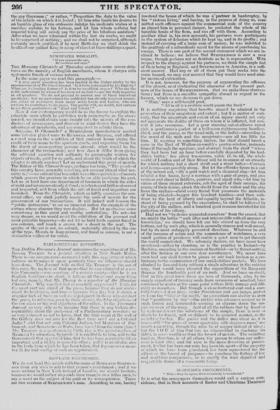THE Morning Chronicle of Thursday contains some severe stric- tures
on the morality of English merchants, whom it charges with systematic frauds of various natures.
In the same paper we read this paragraph :-
" A very great sensation has been excited in the higher circles by the announcement of The Court Journal. Is it to be patronized by his Majesty ? What are its leading features? Is it to be an official organ ? Who are the noble individuals by whom it has been set on foot ?—are the daily inquiries in all quarters. We do not pretend to answer any of these important questions ; but we understand the publisher has already received numer- ous offers of assistance from many noble Lords and Ladies, who are anxious to contribute to its rives. The public will, no doubt, feel curious to see these productions of Rank and Talent.'" Now if our contemporary would do us the favour to explain the
principle upon which he publishes such paragraphs as the above quoted, we should obtain some insight into the morals of the con- ductors of newspapers, and discover in what degree they have the advantage of merchants, and are competent to rebuke them.
Suppose, 0 Chronicle! a Birmingham manufacturer carried some inferior plated ware to RUNDELL and BRIDGE, and offered a round stun on the condition of that eminent house giving the credit, of their name to the spurious goods, and exporting them for the deceit of unsuspecting persons abroad: what would be the character of the transaction ; and how does it differ from giving the editorial sanction and authority to paragraphs written for objects of trade, paid for as puffs, and about the truth of which the adopter is utterly careless ? Let us understand this point of morals. The Editor of the Chronicle says, perhaps too truly, " The people of this country have, generally speaking, not even an idea of what mo- rality is ;"—we entreat him to confide to us those principles of morals which govern the province in which he so ably performs his part. Let us at least have one department of business in which the rules of right and wrong are clearly defined; in:which good faith is observed and respected, and from which the arts of fraud and imposture are banished. From the chronicle, which so loftily exercises the cen- social office, we shall joyfully receive the code of morals for the government of our transactions. It will indeed well beseem the "public instructors," to set an immoral nation the example of the virtues whose absence they now deplore. But let us observe some consistency in this great and worthy undertaking. Do not—for very shame, as we would avoid the exhibition of the grossest and most palpable hypocrisy—do not let us hold forth against fraud in one column, and touch a crown for a deceit in the next. The quality of the act is not, we submit, materially altered by the size of the type. Morals in long-primer, and fraud in minion, is not a distinction sufficient for virtue.


















 Previous page
Previous page